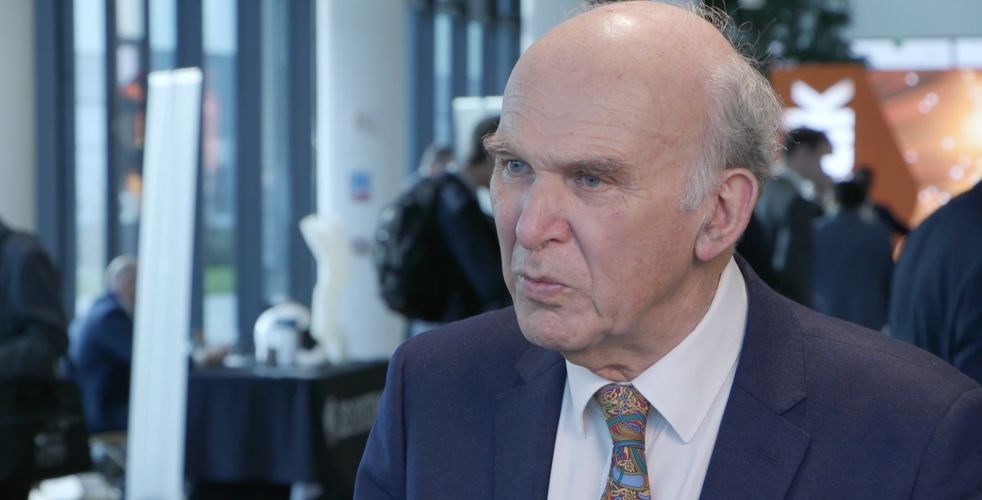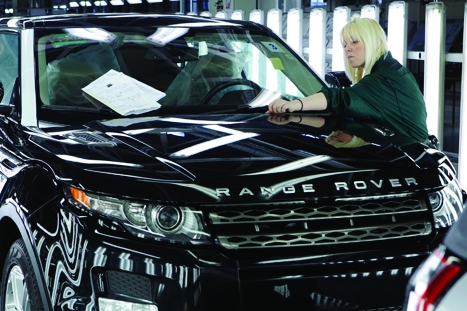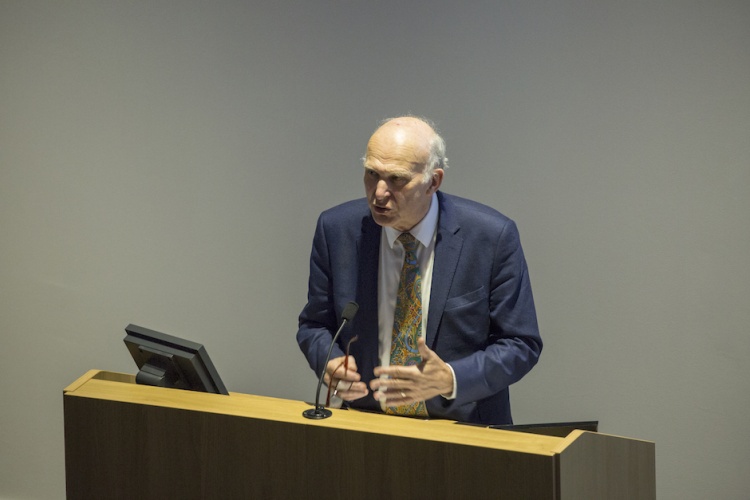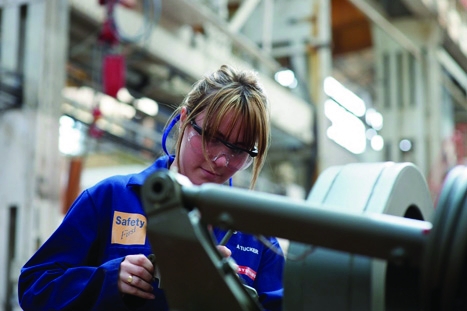
The former Business Secretary is a champion of engineering, skills and innovation. He has also been one of the most prominent opponents of Brexit, and in particular the economic implications of a hard Brexit. During the course of his keynote address, Sir Vince was critical of Britain’s lack of long-term thinking in relation to investment, education and apprenticeships, but also praised aspects of UK innovation that have blossomed in recent years.
Having only won back his parliamentary seat in the June 2017 general election, Sir Vince spoke about how he spent his two years of political exile learning more about German manufacturing, including a stint on the board of a Bavrian Mittelstand automotive supplier.
“It was extraordinarily enlightening to see the way that a fairly bog-standard German car company goes about its business,” he told the C2I conference. “This obsession with productivity, almost on a daily basis. How do we improve every little aspect of production.”
“This is how nearly every German engineering company operates. Our best companies here do it, but we have a long tail of companies that don’t.”
Cable pointed out that engineering plays a part in a huge amount of UK business.
“What essentially people are saying is that every company is becoming a technology company. It has to be to survive…Engineering, instead of being a narrow discipline, is becoming all-embracing.”
Inevitably, Brexit did not take long to surface, but Sir Vince was keen to point out that there are many other challenges facing the UK that do not relate to our relationship with the EU.
“While we argue about Brexit, there are really quite important issues around infrastructure that will be there whatever happens in terms of Britain’s future. It’s important we keep that in perspective.”

Cable gave the example of JLR which, due to limitations in the electricity supply at its West Midlands manufacturing base, is unable to expand operations as it wishes. He noted that while issues such as these had nothing to do with Brexit, exiting the EU would bring other problems.
“Regulatory divergence has enormous practical implications, because if we drift away gradually from the regulatory systems established within the Single Market, that has major business implications.”
Citing the example of Siemens, Sir Vince said the Single Market had enabled the company to reduce the number of specifications it followed from 180,000 to around 10,000. This represented “an enormous simplification”, yet the danger for UK engineering companies was that this “all now goes into reverse”. Exiting the Customs Union, according to Cable, could have more immediate consequences.
“It’s very clear that a decision was made largely on political grounds to take Britain out of the Customs Union, and this has very, very significant implications if you’re a supply chain industry,” he said. “It’s adding, potentially, enormously to the cost and inconvenience of running a business which has got cross-border supply chains, and that’s a point that hasn’t yet been fully assimilated.”
R&D is also likely to suffer, as the UK is a net beneficiary of research funding. On top of this, exiting the EU will see a major source of VC funding dry up.
“40 per cent of all the venture capital in the UK comes through the European Investment Fund. I think it’s something the government probably wasn’t even aware of. This money is now frozen – it’s not coming…so that source of funding for growth enterprises is drying up. Maybe there will be a replacement, but so far the future is very uncertain.”

It’s well-documented that Sir Vince and the Lib Dems are in favour of giving the public a vote on the terms of the deal, but he was keen to point out that businesses should also plan for a No Deal scenario.
“If that happens, we do have to prepare for a major shock. Probably not as serious as the banking crisis in 2008, but nonetheless pretty disruptive.”
Aside from Brexit, the other key challenge the UK is facing is skills and careers.
“The whole supply chain of young people coming through the system is currently blocked, because they’re not getting proper advice,” said Sir Vince, referring to the poor level of careers guidance at schools.
Noting the political disaster that still haunts the Lib Dems over tuition fees, he defended the decision of the coalition back in 2010, stating that it was designed to ensure universities were properly funded. Engineering degrees, for example, cost significantly more than £9,000 per year, as do many STEM qualifications. However, Sir Vince also acknowledged the difficulties faced by young people, and that a better solution should be sought.
“We’ve got to find a way of making university tuition more attractive for young people, while at the same time avoiding the trap of cutting funding, particularly for high-cost subjects.”
The Lib Dem leader was also critical of the Apprenticeship Levy, claiming it was undoing much of the good work achieved in recent years.
“What’s happening is they haven’t got the model sorted,” he said. “There’s a large dropout rate, most small businesses can’t get access to the rebate, and the number of apprenticeship starts has just collapsed. Within the last couple of months it’s fallen by about 60 per cent. This is really disastrous.”

With regards to UK innovation, Sir Vince was more positive. The growth of the Catapult system and Innovate UK should be lauded, but more needs to be done to retain the innovation and intellectual property that originates here. Perhaps surprisingly, Cable also stated that he believed the UK’s takeover regime is far too permissive. He cited the example of ARM’s sale to Softbank, and the atrophy that the British operation is likely to suffer over time.
“We’ve seen this happen many, many times before,” he said. “There are lots of high-tech growth companies currently being bought on the cheap because of the devaluation of the currency…we need some kind of mechanism to ensure that when overseas takeovers are made, there is a screening device to ensure that the implications on our science and technology base are properly considered.”
“Ironically, we probably couldn’t do this within the European Union…so I’m conceding that in a Brexit world there are things you could do positively that you can’t at the moment.”
Our thanks once again to Sir Vince Cable, and indeed to all of our speakers and attendees at this year’s C2I conference. Over the coming weeks we’ll be publishing a series of features on the winning collaborations and shortlisted entries, so keep an eye out for those.





Glasgow trial explores AR cues for autonomous road safety
They've ploughed into a few vulnerable road users in the past. Making that less likely will make it spectacularly easy to stop the traffic for...